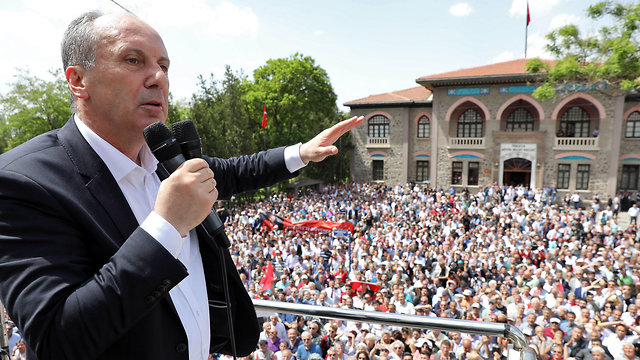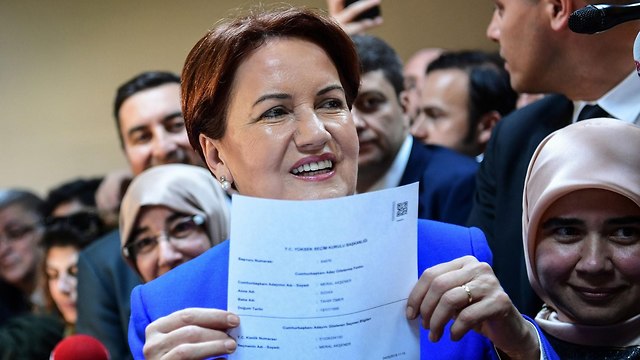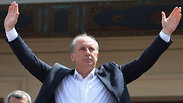

Opposition candidate to Erdoğan: 'Let's race like men'
With President Erdoğan moving elections up by more than a year to shore up hold on power, country's largest opposition party elects combative former physics teacher to run against him; lawmaker Muharrem İnce calls on Erdoğan to free jailed pro-Kurdish party leader, says will not reside in opulent presidential palace if elected.
The presidential candidate for Turkey's main opposition on Saturday called for the release of the pro-Kurdish opposition's jailed candidate, challenging President Tayyip Erdoğan to "let us race like men" in next month's election.
On Friday, the Republican People's Party (CHP) nominated Muharrem İnce to challenge Erdoğan in the June 24 presidential election. The pro-Kurdish Peoples' Democratic Party (HDP) nominated its jailed former leader Selahattin Demirtas.
"The HDP are also children of this nation, the AKP are also children of this country ... Don't keep Demirtas in jail. Come, let's race like men," İnce told crowds of flag-waving supporters in his hometown of Yalova, where he held his first rally.
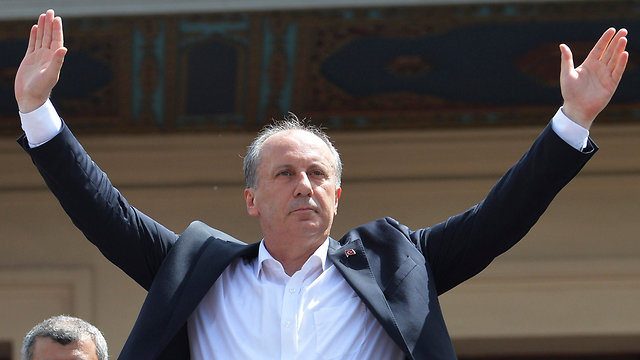
Erdoğan last month called snap parliamentary and presidential elections for June 24, more than a year early, in order to switch to the powerful executive presidency narrowly approved in a referendum last April.
The election is hugely important as it will transform Turkey's governing system to an executive presidency, a constitutional change that was narrowly approved last year in a referendum. As part of the reforms, the office of the prime minister will be abolished, with its powers largely transferred to the president.
The successful candidate needs to secure more than 50 percent of the vote.
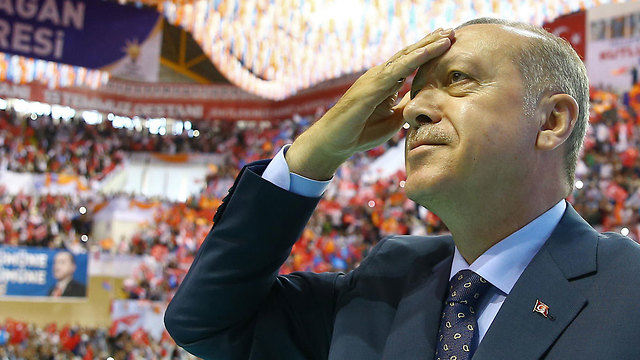
Speaking at a congress in Ankara, the 54-year-old said he would not only represent his party's supporters but all of Turkey's 80 million citizens. İnce, who accused Erdoğan of undermining Turkey's democracy, has been in parliament since 2002, representing his hometown of Yalova in the west of the country.
As a symbol for neutrality, the former physics teacher, who is known for his combative rhetoric, removed his CHP lapel pin to put on a Turkish flag pin.
"We will first establish justice. We will be impartial. We will be independent," İnce promised.
İnce's supporters believe he can court more conservative voters to his party, ones who don't belong to CHP's traditional secular, pro-Western base. If elected president, İnce claimed, he will not reside in the opulent 1,000-room palace Erdoğan had built in Ankara, opting to turn the property into a "paradise of learning" instead.
Ahead of the elections, Erdoğan's ruling AK Party (AKP) formed an election alliance, the "People Alliance", with the Nationalist Movement Party (MHP), which supported Erdoğan in the referendum.
İnce called on CHP members to sign for other candidates seeking 100,000 signatures in order to run for the presidency, including former interior minister Meral Aksener from the Iyi (Good) Party.
Aksener may, in fact, pose the biggest challenge to Erdoğan's continued rule. The former minister created the Iyi Party last year, after leaving the nationalist MHP party. A poll taken in April showed Erdoğan leading with 40 percent of the vote, while Aksener arrived second with 30 percent. İnce, meanwhile, was last with 20 percent of the vote.
On Saturday, the CHP, Iyi Party, Saadet Party and Democrat Party signed a declaration marking a four-way election alliance called the "Nation Alliance", pledging to remove polarization, instill independence for the judiciary and ensure basic rights and freedoms can be exercised.
Rights groups and Turkey's Western allies have criticized Ankara for its deteriorating record on civil rights and have voiced concerns that the NATO member has been sliding further into authoritarianism under Erdoğan.
Since the abortive putsch, authorities have carried out a sweeping crackdown on alleged supporters of the cleric Ankara blames for the coup attempt, detaining 160,000 people and dismissing nearly the same number of civil servants, the United Nations said in March.
The government says the measures are necessary due to the security threats it faces.
The Associated Press contributed to this report.














